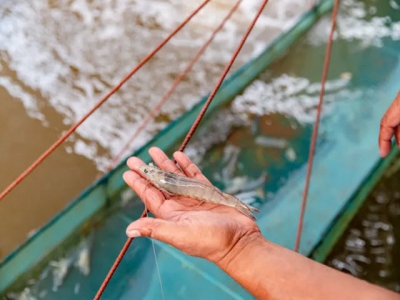Converting airline food waste into aquafeeds

Plans to produce insect protein for the aquafeed sector from discarded airline food have been announced in Singapore today.
Blue Aqua produces vannamei shrimp in a super-intensive system in Singapore dnata, a leading global air services provider, has signed a memorandum of understanding (MoU) with Blue Aqua Food Tech to boost food security in Singapore. The partnership will see Blue Aqua upcycle organic waste from dnata’s catering and ground handling operations into insect protein for aquafeeds.
Blue Aqua processes underutilised nutrients from the leftovers that can be transformed into quality insect proteins for aquacultural use, as a sustainable and efficient alternative to traditional fishmeal.
Compared to traditional protein, according to Blue Aqua, insect protein is a sustainable solution – with low land, water, and carbon footprints, offering a very high yield. The partnership will supply Singapore’s farmers with sustainable access to domestically produced animal feed, which is traditionally imported.
The MoU is the starting point to a deeper partnership between Blue Aqua and dnata, which will look into the development and implementation of a Zero Waste master plan. The air services provider will also add Blue Aqua to its list of suppliers to purchase locally farmed seafood for its catering operations.
Dirk Goovaerts, dnata’s regional CEO for Asia Pacific, said: “We are delighted to partner with Blue Aqua to further decrease food waste and support the local food production supply chain. This initiative will help us minimise our environmental footprint whilst delivering the highest value for our customers and the communities around us.”
Dr Farshad Shishehchian, CEO and founder of Blue Aqua International Group, said: “Blue Aqua has been a strong advocate for sustainable and practical farming since its inception, this partnership with dnata is a perfect fit. We are excited to grow our efforts in food technology to develop a circular economy in aquaculture globally through our network, starting with Singapore.”
Singapore imports more than 90 percent of its food, yet its food waste amounts to 744,000 tonnes annually, of which less than 20 percent is recycled. Blue Aqua’s waste-to-protein programme aspires to significantly reduce food waste across Singapore’s food supply chain through aquaculture.
This is in line with Singapore’s vision of being a Zero Waste Nation, which means the recycling rate has to be increased to 70 percent. Singapore has also set a goal to produce 30 percent of its food domestically by 2030 - a strategy that envisages aquaculture playing an important role. However, local farms still rely heavily on imported feed and raw materials, which the programme is aiming to mitigate.
Có thể bạn quan tâm
 The circular economy: why Indonesian shrimp farmers are changing the shape of their ponds
The circular economy: why Indonesian shrimp farmers are changing the shape of their ponds Circular shrimp ponds are increasingly being used by small-scale farmers and entrepreneurs in Indonesia, where they are also receiving government backing.
 Countering AMR in Egypt's tilapia farming sector
Countering AMR in Egypt's tilapia farming sector A project that aims to reduce the need for antibiotics in Egypt’s tilapia farming sector is gaining momentum.
 New tool promised to tackle HABs in aquaculture
New tool promised to tackle HABs in aquaculture A system that gives fish farmers advanced warning of harmful algal blooms (HABs) is due to be commercially available within 18 months.